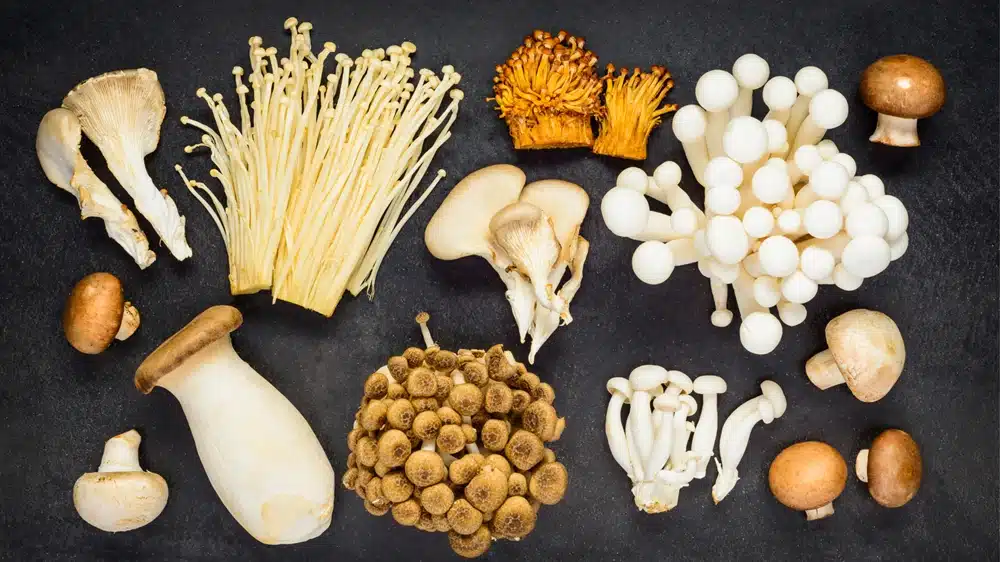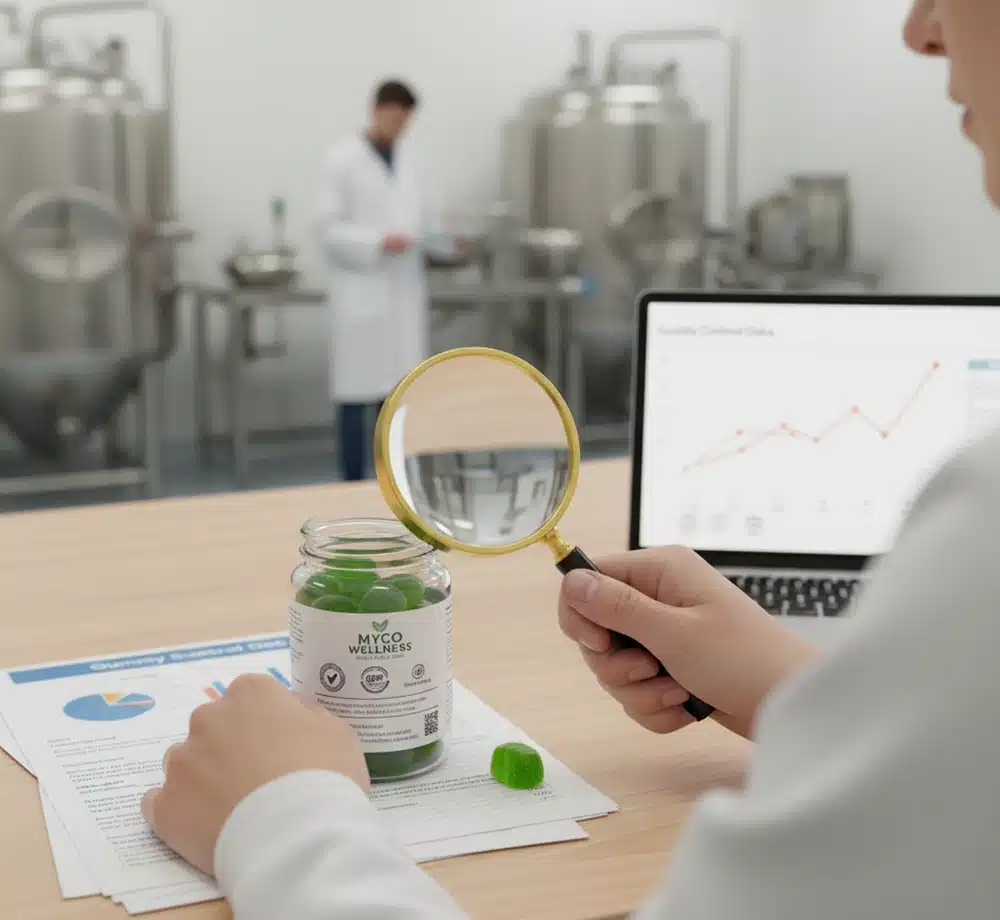If you follow wellness trends, you’ve seen them. Mushroom gummies are suddenly everywhere in 2025, flooding social media feeds and popping up on health store shelves, promising everything from laser-sharp focus to a calmer mind and a supercharged immune system.

The trend is anchored in staggering data. The global functional mushroom market was valued at over $31 billion in 2024 and is projected to climb past $33.7 billion in 2025. This explosive growth shows a massive shift in how we approach our health, with millions trading in traditional pills for these convenient, flavorful gummy supplements.
In this guide, we will cut through the noise. We’ll explore the real data behind their popularity, the science of what each mushroom actually does, and—most importantly—give you the expert knowledge to read a label and choose a high-quality product that actually works.
Why Gummies? The 2025 Wellness Trend Explained
The shift towards gummy supplements market dominance isn’t just a fleeting fad; it’s a calculated response to evolving consumer preferences in the health and wellness landscape of 2025. While functional mushrooms have been revered in traditional medicine for centuries, their modern surge in popularity, particularly in gummy form, is a testament to convenience meeting efficacy.
The Rise of the Gummy Factor
Let’s face it: not everyone enjoys the earthy, often bitter taste of mushroom powders or the ritual of brewing mushroom teas. This is where gummies shine.
- Precise Dosing: Each gummy is typically pre-measured with a specific dose of mushroom extract, eliminating the guesswork associated with powders and ensuring consistent delivery of active compounds.
- Taste Transformation: Gummies skillfully mask the distinct flavors of mushroom extracts, transforming them into palatable, often fruit-flavored, daily treats. This dramatically improves user compliance, ensuring consistent intake for sustained benefits.
- On-the-Go Convenience: In our fast-paced 2025 lifestyle, portability is paramount. Gummies offer a mess-free, water-free solution, easily consumed at your desk, in the car, or after a workout, unlike bulky powders or pills that require a beverage.
What Are the Active Compounds? The Science Behind the “Why”
The allure of functional mushroom gummies isn’t solely about taste and convenience; it’s deeply rooted in the bioactive compounds they contain. These aren’t inert ingredients; they are complex molecules that interact with our body’s systems, driving the sought-after health benefits.
- Beta-Glucans: These are polysaccharides, a type of complex carbohydrate, found abundantly in the cell walls of functional mushrooms. They are perhaps the most studied compounds and are renowned for their immunomodulating properties. Rather than simply boosting the immune system, beta-glucans help “modulate” it, meaning they can help balance and optimize the immune response, making it more efficient without overstimulating it. This is a key reason for the immune support claims associated with mushrooms like Reishi and Turkey Tail.
- Triterpenes: Found particularly in mushrooms like Reishi, triterpenes are a class of organic compounds known for their potential anti-inflammatory, antioxidant, and adaptogenic properties. Specific triterpenes, such as ganoderic acids in Reishi, are believed to contribute to its calming effects and ability to support the body’s stress response. They play a role in why Reishi is often called the “mushroom of immortality” or the “chill mushroom.”
The innovative combination of these powerful natural compounds with the appealing format of a gummy is a significant driver behind why mushroom supplements gummies have become such a prominent feature in the 2025 wellness sphere, moving beyond a niche product to a mainstream health staple.
A Guide to the “Functional Five”: What Each Mushroom Does
While the convenience of gummies is undeniable, the true power lies within the specific functional mushrooms they contain. Each species brings its own unique profile of bioactive compounds, targeting distinct aspects of health and wellness. In this section, we’ll delve into the “Functional Five,” the most commonly found and well-researched mushrooms in mushroom supplements gummies, and explain the specific benefits associated with each.
| Mushroom Name | Key Benefits | Why it Works (Core Mechanism) |
| Lion’s Mane | Focus, Memory, Nerve Support | Stimulates Nerve Growth Factor (NGF) |
| Reishi | Stress Relief, Sleep, Immune Support | Adaptogen; Triterpenes & Beta-Glucans |
| Cordyceps | Energy, Stamina, Performance | Enhances ATP production & Oxygen Utilization |
| Chaga | Antioxidant, Immune, Anti-inflam. | High ORAC Score, Rich in antioxidants (Vitamin D2 source) |
| Turkey Tail | Immune Support, Gut Health | PSK & PSP Beta-Glucans; Prebiotic fibers |
Lion’s Mane (Hericium erinaceus)
Often recognized by its shaggy, white appearance resembling a lion’s mane, this mushroom has gained significant traction for its potential cognitive benefits.
- Benefit Profile: Enhances focus, supports memory, promotes nerve health, and can even contribute to a balanced mood. It’s a favorite among students, professionals, and anyone seeking a mental edge.
- The Science: Lion’s Mane contains unique compounds called hericenones and erinacines. Research suggests these compounds may stimulate the production of Nerve Growth Factor (NGF) in the brain. NGF is a protein that plays a crucial role in the growth, maintenance, and survival of neurons, which are vital for learning and memory.
Reishi (Ganoderma lucidum)
Dubbed the “mushroom of immortality” in Eastern cultures, Reishi is perhaps the most revered adaptogenic mushroom.
- Benefit Profile: Promotes relaxation, aids in better sleep, helps manage stress, and supports a healthy immune system. It’s ideal for unwinding after a long day or navigating periods of high demand.
- The Science: Reishi is rich in triterpenes and polysaccharides, particularly beta-glucans. Its adaptogenic properties mean it helps the body adapt to and cope with various stressors, whether physical, chemical, or biological. The triterpenes are thought to contribute to its calming effects, while beta-glucans are key for its immune-modulating actions.

Cordyceps (Cordyceps militaris)
Unlike typical cap-and-stem mushrooms, Cordyceps is a parasitic fungus traditionally found on insect larvae (though most commercial supplements use lab-grown versions). It’s renowned for its invigorating properties.
- Benefit Profile: Boosts natural energy levels, enhances athletic performance, improves stamina, and supports respiratory health. It’s a go-to for athletes and anyone needing a natural pick-me-up without the jitters of caffeine.
- The Science: Cordyceps contains compounds like cordycepin and adenosine, which are believed to enhance the body’s production of Adenosine Triphosphate (ATP). ATP is the primary molecule for storing and transferring energy in cells. By increasing ATP synthesis, Cordyceps may help improve oxygen utilization (often measured as VO2 max), leading to increased stamina and reduced fatigue during physical exertion.
Chaga (Inonotus obliquus)
Growing primarily on birch trees in cold climates, Chaga forms a charcoal-like conk. It’s celebrated for its exceptionally high antioxidant content.
- Benefit Profile: Provides powerful antioxidant protection against free radical damage, supports immune function, and has anti-inflammatory properties.
- The Science: Chaga boasts one of the highest ORAC (Oxygen Radical Absorbance Capacity) scores of any natural food, indicating its potent ability to neutralize free radicals. It’s rich in melanin, polyphenols, and various triterpenes. Beyond its antioxidant prowess, Chaga is also a natural source of nutrients. Interestingly, when exposed to UV light, specific types of mushrooms can produce Vitamin D2, making Vitamin D2 Mushroom Powder from sources like Chaga an increasingly popular option for plant-based vitamin D supplementation, further enhancing its nutritional appeal.
Turkey Tail (Trametes versicolor)
Named for its beautiful, concentric rings of brown and tan resembling a turkey’s tail, this mushroom is a champion of immune support.
- Benefit Profile: Offers robust immune system support, enhances gut health by acting as a prebiotic, and provides general wellness benefits.
- The Science: Turkey Tail is particularly rich in two well-studied polysaccharide-peptides: PSK (Polysaccharide Krestin) and PSP (Polysaccharide Peptide). These compounds are known for their ability to stimulate and modulate the immune system, activating various immune cells. Furthermore, Turkey Tail contains beneficial prebiotics that feed gut bacteria, contributing to a healthy microbiome, which is intrinsically linked to overall immune function.
Understanding the specific benefits and scientific underpinnings of each of these “Functional Five” mushrooms is crucial for choosing the right mushroom supplements gummies to support your personal wellness goals.
You’ve got it! Here’s the “How to Buy” section, naturally incorporating “gummy supplement manufacturer.
How to Buy the Best Mushroom Gummies in 2025
The rapidly expanding market for mushroom gummies means that while choice is abundant, quality can vary wildly. As an educated consumer in 2025, knowing what to look for on a label is paramount to distinguishing effective, high-quality mushroom supplements gummies from overpriced, ineffective products. This section will empower you with the crucial knowledge to make informed decisions and scrutinize the claims made by every gummy supplement manufacturer.

Key observation points: fruiting bodies and mycelium
This is perhaps the single most important distinction when buying any functional mushroom product, including gummies. It determines the true potency and efficacy of the supplement, and it’s a key indicator of a reputable gummy supplement manufacturer.
- Fruiting Body: This is the actual, visible mushroom—the cap and stem that grow above ground or on wood. For thousands of years, traditional medicine has exclusively used the fruiting body. This is where the highest concentrations of beneficial compounds like beta-glucans and triterpenes are found. Think of it as the “fruit” of the mushroom plant, dense with active ingredients.
- Mycelium: This is the root-like network of the fungus, typically grown in a lab on a grain substrate (like oats, rice, or sorghum). When the mycelium is grown on grain, and then the entire biomass (mycelium + grain) is harvested and ground into a powder, the final product can be significantly diluted with starch from the grain. While mycelium does contain some beneficial compounds, the concentration of key active ingredients, particularly beta-glucans, is generally much lower than in the fruiting body.
- The Verdict: Always look for labels that explicitly state “100% Fruiting Body Extract” or similar clear language. If a label simply says “mushroom extract” or mentions “mycelium,” proceed with caution, as it often indicates a lower quality product diluted by grain, regardless of what the gummy supplement manufacturer claims.
Read the Label: Extraction, Dosage, and Potency
Beyond the source material, how the mushroom is processed and presented on the label is vital. Transparency here reflects the integrity of the gummy supplement manufacturer.
- Extraction Method: Not all compounds in functional mushrooms are water-soluble; some require alcohol to be released. Therefore, the gold standard is a “Dual-Extraction” method (using both hot water and alcohol). This ensures that the full spectrum of beneficial compounds, including both water-soluble beta-glucans and alcohol-soluble triterpenes, is captured. If a gummy doesn’t specify dual-extraction, it might be missing crucial components, which suggests a less thorough approach by the gummy supplement manufacturer.
- Dosage: Check the per-serving dosage for each mushroom extract. While optimal doses can vary, a common and often effective range for a single mushroom extract in gummies is typically between 250mg to 1000mg per serving. Be wary of products with extremely low dosages that may offer minimal benefits.
- Potency/Standardization: High-quality brands and reputable gummy supplement manufacturer will often standardize their extracts, meaning they guarantee a minimum percentage of active compounds. Look for statements like “Standardized to >30% Beta-Glucans”. This transparency is a strong indicator of a reputable brand that prioritizes efficacy. If the label only lists the total mushroom weight without mentioning standardized compounds, you have no way of knowing the actual potency.
Check for Quality: Third-Party Testing and Other Ingredients
True quality goes beyond just the mushroom itself. The best gummy supplement manufacturer will emphasize rigorous testing.
- Third-Party Testing: Since mushroom supplements gummies are dietary supplements and not pre-approved by the FDA, independent third-party lab testing is crucial. Reputable brands will test their finished products for:
- Purity: Absence of heavy metals (lead, mercury, cadmium), pesticides, and other contaminants.
- Potency: Verification that the labeled amount of active compounds (like beta-glucans) is actually present.
- Look for Certificates of Analysis (COAs) on the brand’s website to verify these claims. A gummy supplement manufacturer that provides easy access to COAs demonstrates confidence in their product.
- Other Ingredients: Don’t forget the rest of the gummy!
- Sugar Content: Gummies, by nature, often contain sugar. Compare brands and opt for those with lower sugar content per serving, or natural sweeteners like stevia or erythritol if available.
- Gelling Agent: Pectin (plant-derived) is a good choice for vegan and vegetarian consumers, while gelatin (animal-derived) is also common. Choose according to your dietary preferences.
- Artificial Additives: Prioritize brands that use natural colors and flavors over artificial ones.
By applying these critical criteria, you can navigate the complex gummy supplements market with confidence and select mushroom supplements gummies that genuinely support your health and wellness goals in 2025, choosing wisely from the many options presented by every gummy supplement manufacturer.
Safety, Regulation, and Potential Side Effects
While the appeal of mushroom supplements gummies is clear, a comprehensive guide wouldn’t be complete without addressing safety, regulation, and potential side effects. Navigating the landscape of dietary supplements requires a clear understanding of what oversight exists and what precautions consumers should take.
Are Mushroom Gummies Regulated?
Unlike pharmaceuticals, which undergo rigorous pre-market approval by the Food and Drug Administration (FDA) in the United States, dietary supplements—including mushroom supplements gummies—are not subject to the same strict regulations.
- FDA Oversight: The FDA does not approve dietary supplements for safety or effectiveness before they are marketed. Instead, the responsibility largely falls on the gummy supplement manufacturer to ensure their products are safe and accurately labeled. The FDA can take action against a product after it’s on the market if it’s found to be unsafe, mislabeled, or contains prohibited ingredients.
- Good Manufacturing Practices (GMP): The FDA does establish Good Manufacturing Practices (GMPs) that gummy supplement manufacturing facilities must follow. These regulations cover aspects like facility cleanliness, ingredient quality control, proper product testing, and accurate labeling. While GMPs are a crucial step towards quality assurance, they don’t guarantee efficacy or pre-market safety approval of the product itself.
- The Importance of Manufacturer Transparency: Because of this regulatory framework, the integrity and transparency of the gummy supplement manufacturer become paramount. This reinforces why looking for third-party testing, clear ingredient lists, and adherence to “100% Fruiting Body Extract” (as discussed previously) are so critical for consumers. It’s up to you to be an informed detective.
Potential Side Effects
Generally, functional mushroom gummies are considered safe for most healthy individuals when consumed within recommended dosages. However, like any supplement, they are not entirely without potential side effects.
- Mild Digestive Upset: Some individuals may experience mild gastrointestinal discomfort, such as bloating, gas, or an upset stomach, especially when first introducing mushroom supplements. Starting with a lower dose and gradually increasing it can often mitigate this.
- Allergic Reactions: As with any food or plant-based product, allergic reactions are possible, though rare. Symptoms might include skin rashes, itching, or difficulty breathing. Discontinue use immediately if you suspect an allergic reaction.
- Interactions with Medications: Functional mushrooms, particularly Reishi, can have effects on blood pressure and blood sugar, and may also possess anticoagulant properties.
- Blood Thinners: Individuals on blood-thinning medications (anticoagulants) should exercise caution and consult a healthcare professional, as some mushrooms might increase the risk of bleeding.
- Diabetes Medications: Those taking medication for diabetes should monitor their blood sugar closely, as some mushrooms could potentially lower blood sugar levels.
- Immunosuppressants: Given their immune-modulating effects, functional mushrooms could theoretically interact with immunosuppressant drugs.
- Pregnancy and Breastfeeding: There is insufficient research on the safety of functional mushroom supplements during pregnancy and breastfeeding. It is always advised to avoid use during these periods unless specifically recommended and supervised by a healthcare provider.
- Standard Disclaimer: It is always prudent to consult with your doctor or a qualified healthcare professional before starting any new supplement regimen, particularly if you have pre-existing health conditions, are taking medications, or are pregnant or nursing. They can provide personalized advice based on your individual health profile and review the specifics of your chosen gummy supplement manufacturing and product.
By understanding the regulatory environment and potential individual responses, consumers can approach mushroom supplements gummies with realistic expectations and prioritize their safety and well-being.
Conclusion: Are Mushroom Gummies Worth the Hype?
The “hype” surrounding functional mushroom gummies isn’t entirely unfounded. The data confirms a significant and growing interest in these natural powerhouses. They offer a genuinely convenient and palatable way to integrate the time-honored benefits of functional mushrooms like Lion’s Mane for focus, Reishi for calm, Cordyceps for energy, Chaga for antioxidants, and Turkey Tail for immunity into our daily routines. For many, they provide an accessible entry point to the world of adaptogens and immune modulators, which traditional powders or capsules might not.
However, the rapid growth of the gummy supplements market means it’s also ripe with products that might not deliver on their promises. The lack of stringent pre-market regulation puts the onus squarely on the consumer to be informed. Without careful attention to sourcing, extraction, and testing, a beautiful jar of gummies could turn out to be little more than expensive candy.
In 2025, functional mushroom gummies are more than just a passing trend; they’re an integral part of the modern wellness toolkit. By becoming a discerning buyer, armed with the knowledge from this guide, you can confidently navigate the options and harness the genuine benefits these incredible natural compounds have to offer.
Frequently Asked Questions (FAQ)
Resource
- The trend is anchored in staggering data. The global functional mushroom market was valued at over $31 billion in 2024 and is projected to climb past $33.7 billion in 2025.(Regarding market value and trends, source link: https://www.fortunebusinessinsights.com/industry-reports/functional-mushrooms-market-101511)
- The bioactive compounds contained in functional mushroom gummies.(source link:https://pmc.ncbi.nlm.nih.gov/articles/PMC7826851/



